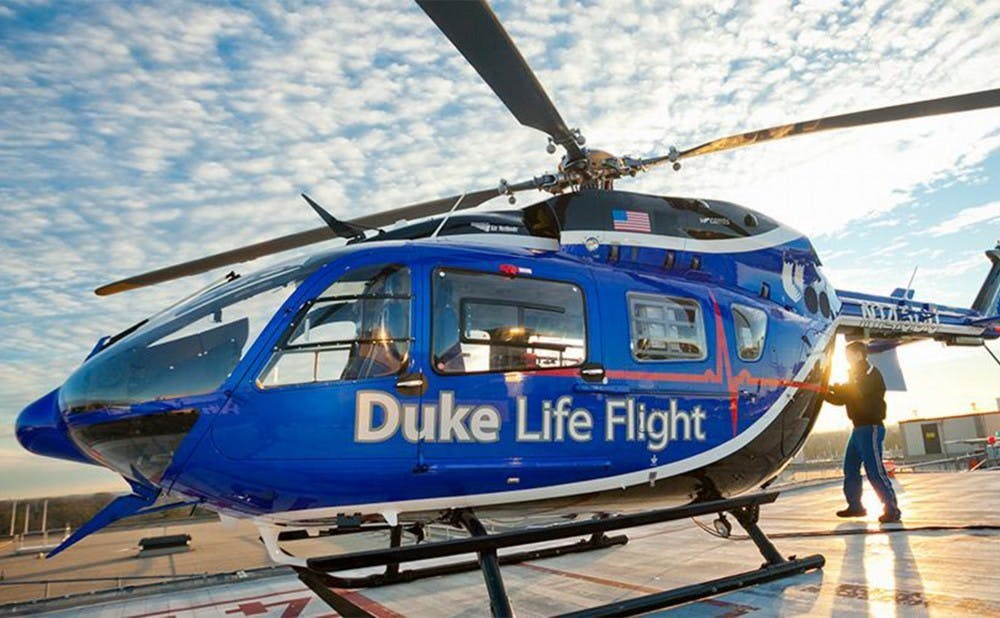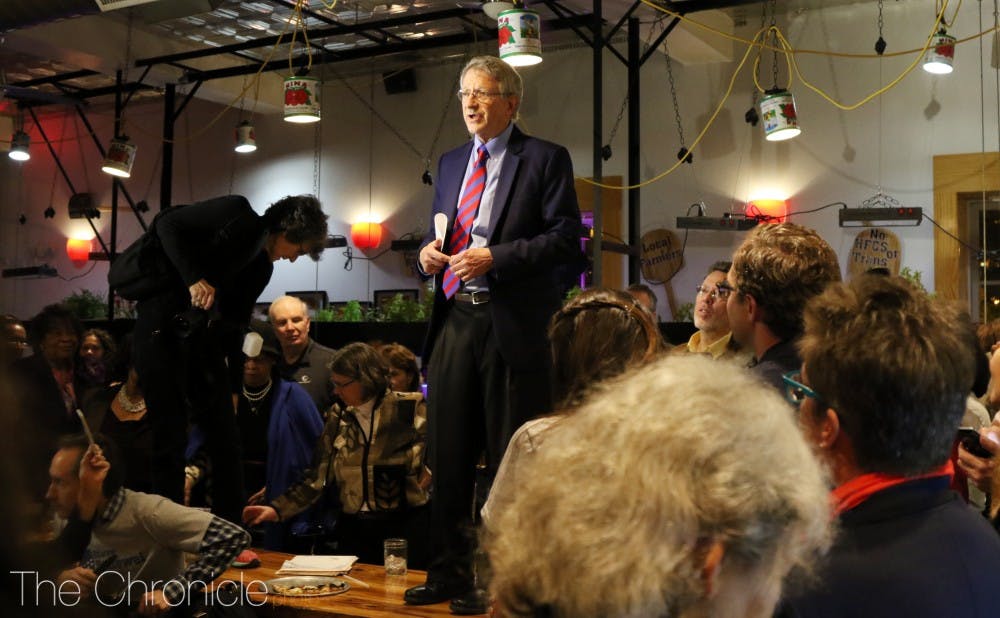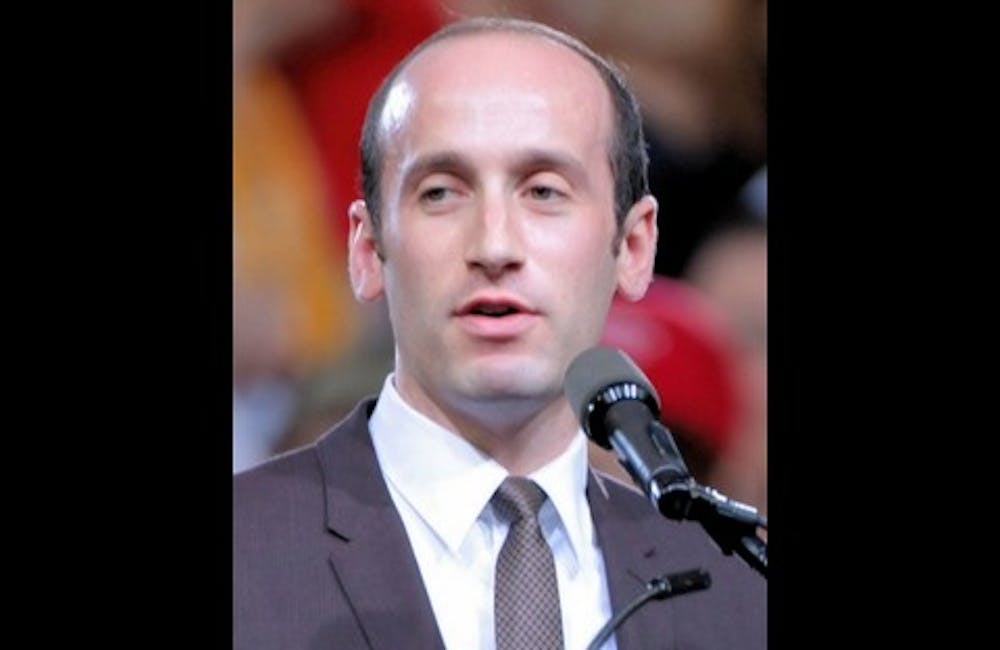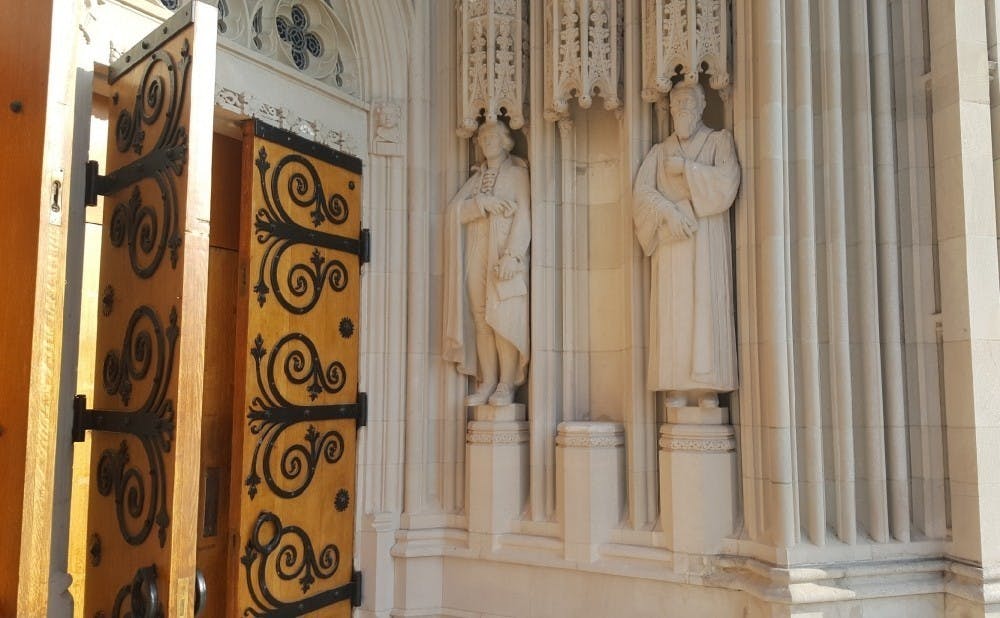As 2017 nears its end, The Chronicle takes a look back at its top 10 news stories from the year. Check back each day to see which story will be revealed next as 2018 quickly approaches.
1. Robert E. Lee statue outside Duke Chapel is removed
In mid-August, President Vincent Price ordered the removal of the controversial Robert E. Lee statue. The Confederate general's figure stood at the Chapel's entrance, but who exactly ordered Lee’s statue to be placed in the Chapel is somewhat of a mystery.
Earlier in the week, Durham protesters toppled a confederate statue near East Campus. Then, the Lee statue was vandalized overnight, which Price and Luke Powery, dean of the Chapel. Several hundred alumni signed a petition advocating for the removal of the statue and pledging to withhold their donations until it is removed. Finally, over the weekend, the statue was removed.
“After hearing from and consulting with a number of students, faculty, staff, and alumni, and with the strong support of the Board of Trustees, I authorized the removal of the statue of Robert E. Lee from the entrance of Duke Chapel early this morning,” Price said. “I took this course of action to protect Duke Chapel, to ensure the vital safety of students and community members who worship there, and above all to express the deep and abiding values of our university.”
Two weeks after the removal, Price established the Commission on Memory and History and issued three charges for the 16-member commission. Members were asked to propose principles to guide Price and the trustees in the event of controversy about a memorial or the naming of a campus facility. Furthermore, the commission was charged to provide input to Price and the trustees in developing procedures in future situations. The commission was to also provide options for the vacant space outside Duke Chapel where Lee once stood
In December, the University announced that the commission provided two options for the vacant Lee space. The primary recommendation—“preferring to leave the space open for a year before taking further action”—was supplemented with the possibility of installing a plaque describing the history and significance of the empty space. Price accepted this recommendation.
“I am accepting the Commission’s first recommendation of leaving the space vacant and initiating an open and deliberative process that will involve all members of the Duke community,” Price wrote in his announcement.
2. Price formally becomes 10th president of Duke
Although Price assumed the office on July 1, his inauguration wasn't until Oct. 5.
The inauguration ceremony was expected to draw more than 3,000 guests. Notable attendees included then-Durham Mayor Bill Bell, University of Pennsylvania President Amy Gutmann, and two former Duke presidents—Nannerl Keohane and Richard Brodhead. Gutmann, Bell and Jack Bovender, chair of the Board of Trustees, also spoke at the event, in addition to Price.
In his address, Price highlighted the importance of regeneration and growth of the University in a new age while reaffirming Duke’s commitment to the highest standard of teaching. Reflecting on the University’s role in North Carolina and abroad, he pledged to use Duke's intellect not only to better the world as a whole but also improve the local community in which Duke resides.
“We are called upon to answer the challenges of the day,” he said. “So let us think of today not so much as a beginning but as another renewal, both a renewed commitment to values that guided the choices of our predecessors at Duke, and a renewed charge to make bold choices of our own.”
The festivities for Price's inauguration actually started the day before the actual inauguration with a faculty symposium comprised of two panels. Philip Bennett, Eugene C. Patterson professor of the practice of public policy studies and journalism, and Abbas Benmamoun, vice provost for faculty advancement, respectively, moderated the panels.
Students also attended PricePalooza, a student-organized carnival held on East Campus to celebrate Price. The carnival had multiple rides, fried food and live entertainment.
3. Duke helicopter crashes in eastern N.C. leaving four dead
A Duke LifeFlight, a helicopter affiliated with Duke Hospital, crashed in eastern North Carolina, killing four in early September.

The crash occurred at approximately 11:45 a.m. in Perquimans County in eastern North Carolina near the Amazon Wind Farm U.S. East complex. There were no survivors. In a joint letter to Duke students, faculty and staff, Price and A. Eugene Washington, chancellor for health affairs and CEO of the Duke University Health System, wrote that they were "deeply saddened" by the news of the crash.
"The men and women of Duke LifeFlight put themselves at risk every day to save the lives of others, and the colleagues we lost in today’s terrible tragedy embodied Duke’s commitment to service and healing," they wrote. "Our thoughts are with their families, friends and colleagues."
A memorial service was held Sept. 20, honoring the three Life Flight team members and the patient that died, in Duke Chapel. On board the flight were nurses Kris Harrison and Crystal Sollinger, pilot Jeff Burke and patient Mary Bartlett.
Later in September, the National Transportation Safety Board released a preliminary investigation report, including eye witness accounts from individuals who saw the flight right before it crashed.
"One witness reported that the helicopter was 'hovering' and 'not travelling forward' while it was a 'couple of hundred feet' above the wind turbine farm," the report noted. "Another witness reported hearing a 'popping noise.' He then observed the helicopter turn left, then right. It then descended quickly and appeared 'in control' with the rotors turning before he lost sight of it."
The report identified the helicopter as a Eurocopter Deutschland, which was manufactured in 2011. The most recent 30-hour engine inspection was completed Aug. 15.
4. Students, lawyers criticize student conduct process
Earlier this year, The Chronicle published a multi-part series on the student conduct process.
The first story followed one student who went through the process and felt she was treated unfairly. The student received an email from the Office of Student Conduct, explaining that she was under investigation for allegedly cheating on a series of public policy quizzes. After five months, she was found not responsible for cheating.
In the second story, legal experts and others who have interacted with the student conduct process brought forward problems with it.
“I’ve not encountered a process or an administration of the process in any school that is less fair than the undergraduate conduct board hearings that Duke students go through,” said Robert Ekstrand, Law School ‘98—a Durham lawyer who was involved in the lacrosse case and has worked on hundreds of disciplinary cases involving students at Duke and institutions across the country. “If I was a wrongly accused student, it is the last hearing process that I would want to have adjudicate my case."
The third story followed four more students’ negative experiences with OSC. They also discussed their concerns, including incomplete or inadequate investigations into their cases, difficulty introducing witnesses for their defense and a “guilty until proven innocent” mindset of the boards.
In the fourth story, members of Alpha Epsilon Pi shared their interaction with OSC. The fifth story heard from former panelists who expressed positive views of the process.
5. Men’s soccer player Ciaran McKenna accused of sexual assault sues Duke for allegedly violating his due process rights
The University suspended McKenna in late January after deciding that he had violated the Student Sexual Misconduct Policy. Following that, McKenna filed a lawsuit against Duke and Stephen Bryan, associate dean of students and director of the Office of Student Conduct.
According to the lawsuit, the case was originally heard by an OSC panel in July 2016, which concluded that the female student did not verbally deny consent though her actions did not give consent either. McKenna then appealed this ruling. After an appeals board concluded that the panel had not applied the correct "reasonable person" standard pursuant to Duke policy, the lawsuit said the case was supposed to be sent back to the original panel. But the player alleges Bryan set up a new panel to hear the dispute instead, and that this panel found that the female student had in fact verbally denied consent.
The player alleges in the lawsuit that Bryan violated Duke policy in setting up the second panel, especially when he alleges the first panel had partially cleared him of wrongdoing. James Coleman, John S. Bradway professor of the practice of law and faculty advisor to McKenna, testified during the hearings for the lawsuit that remanding to an entirely new panel violated the University's student conduct policy.
Tim Bounds, senior director for strategic operations, and Sue Wasiolek, associate vice president for student affairs and dean of students, also testified during the hearings on the procedures for handling sexual misconduct allegations at Duke.
After days of testimony, Judge Orlando Hudson issued a ruling on a preliminary injunction Feb. 15 allowing suspended McKenna to remain at Duke.
The alleged sexual assault occurred early in the morning Nov. 14, 2015, after the alleged victim and McKenna—both first-years at the time—met at Shooters II Saloon. From there, McKenna’s account of events differ from the victim’s. McKenna says in his statement of facts in the first OSC panel that they engaged in consensual sexual acts before and after intercourse in her room. However, according to the second OSC panel’s report, the female student claimed she did not want to lose her virginity, pulled away from him before sex and said no during intercourse.
6. Graduate student sues the University for allegedly mishandling rape allegations
Over the summer, a graduate student filed a lawsuit against Duke for allegedly mishandling a rape allegation she reported against the live-in partner of a Women’s Center employee.
The Women’s Center employee and the live-in partner are also defendants in the suit, which was originally filed in May. The complaint charges that the alleged rapist accessed the student’s information through the employee’s access privileges. The suit also alleges that the employee and the accused rapist conspired to “threaten, harass, intimidate and disparage” the graduate student in retaliation for filing the complaint and to prevent any further criminal investigation.
In August, Duke University, the Women's Center employee and her partner filed motions to dismiss the lawsuit.
The new motions argue that the graduate student’s original complaint fails to state any “credible claim” against the defendants, and that the complaint lacks specific details about how the defendants allegedly entered into an agreement to interfere with the sexual assault investigation.
Later in the month, the graduate student filed an amended complaint, alleging that she was told by the partner about his relationship with the Women’s Center employee. According to the complaint, the partner said the employee would use her position to obstruct the report of rape and damage the graduate student’s reputation.
“We will make you be quiet,” the employee’s partner allegedly said.
The University, the Women’s Center employee and the partner filed motions to dismiss the amended complaint in December.
7. Steve Schewel becomes mayor of Durham
Although the 2017 Durham mayoral race saw low voter turnout from Duke students, it was the first time in many years Durham elected someone other than Bill Bell, who has served as mayor for 16 years, to the post.
Bell endorsed mayoral candidate Farad Ali to ensure that “at least four persons on the city council will have had some form of city council leadership,” referring to the fact that Schewel and three others would retain their seats to compliment the new wave of city council members being elected this year. Despite not getting Bell’s endorsement, Schewel, Trinity '73 and Ph.D. '82, outpaced Ali with the most organization endorsements during the race.
Both candidates also had some relationship with the University. Ali served on the Board of Trustees for the Duke University Health System. Schewel, who received more donations from Duke employees, has been a visiting professor at the Sanford School of Public Policy.

In November, Schewel won the mayoral seat with 59.5 percent of the vote. He met with Duke’s Board of Trustees at its December meeting to discuss the Duke-Durham relationship. At the swearing-in ceremony, Schewel expressed an eagerness to begin his new role as mayor of Durham.
“I’m feeling a big weight of responsibility,” Schewel said during the reception prior to the swearing-in. “But I’m excited to do it and I’m excited to get going.”
8. Moneta announces that Central Campus won’t house undergraduates after 2019
At a Duke Student Government Senate meeting in September, Larry Moneta, vice president for student affairs, said the University plans to phase out undergraduate housing on Central Campus by summer of 2019.
“The game plan is to retire Central Campus by the summer of 2019 and relocate everyone who would be on central to The Hollows and Swift complex,” Moneta said, referring to the Hollows Residence Hall and 300 Swift Apartments.
In 1965, Duke purchased the land between East and West Campuses from Burlington Industries for about $900,000. When the campus was originally constructed, it was built in an apartment style to accommodate the needs of graduate students and their families. Now, it seems that the campus might go back to serving its original purpose.
Moneta listed some alternative options for the use of the 57 acres on Central Campus once undergraduates are moved out, including office buildings, classroom space and graduate housing.
9. Group of concerned students alleges hazing in black fraternities, sororities
In early November, a group calling itself Concerned Black Students wrote a letter, alleging hazing in National Pan-Hellenic Council organizations at Duke.
There are eight NPHC chapters, historically African American fraternities and sororities, at Duke. Concerned Black Students sent the letter to Moneta and other campus leaders about “the annual abuse of black students,” in reference to the pledging process of NPHC organizations. They wrote that the University has attempted to cover up the hazing.
In Moneta’s response to the letter, he refuted the group’s claims, stating that Duke has “no interest” in covering up hazing. He added that the University has “always” taken hazing allegations seriously and cited past instances where student groups were held accountable.
“Nothing has changed and nothing will change,” Moneta wrote. “I regret that whomever you are, you felt need to use this communications method and have taken the position that Duke would rather hide evidence of hazing than take quick and decisive action.”
10. Former Chronicle columnist Stephen Miller becomes President Donald Trump’s senior policy adviser
Miller, Trinity ’07, was one of the chief architects of the executive order that includes a halt on immigration from seven predominantly-Muslim countries and indefinitely bans Syrian refugees. The executive order received criticism from universities across the country, including from then-President Richard Brodhead. In addition, Duke alums drafted an open letter to Miller, expressing their disappointment in his involvement in creating the immigration ban.
Controversy didn’t start in 2017 for Miller, however. While at Duke, Miller authored more than 20 columns as an outspoken critic of political correctness. His columns included a series taking apart the rape accusations made against the Duke lacrosse players.

"Our fellow students are not on trial because of evidence, but in spite of it," Miller once wrote. "This is a moral, social and legal outrage. It is an assault on our peers, our community and the core values of our nation."
Although Miller may have been advocating for facts during the Duke Lacrosse scandal, he has been criticized for spouting debunked claims about mass voter fraud in the 2016 election on national television.
Get The Chronicle straight to your inbox
Signup for our weekly newsletter. Cancel at any time.

